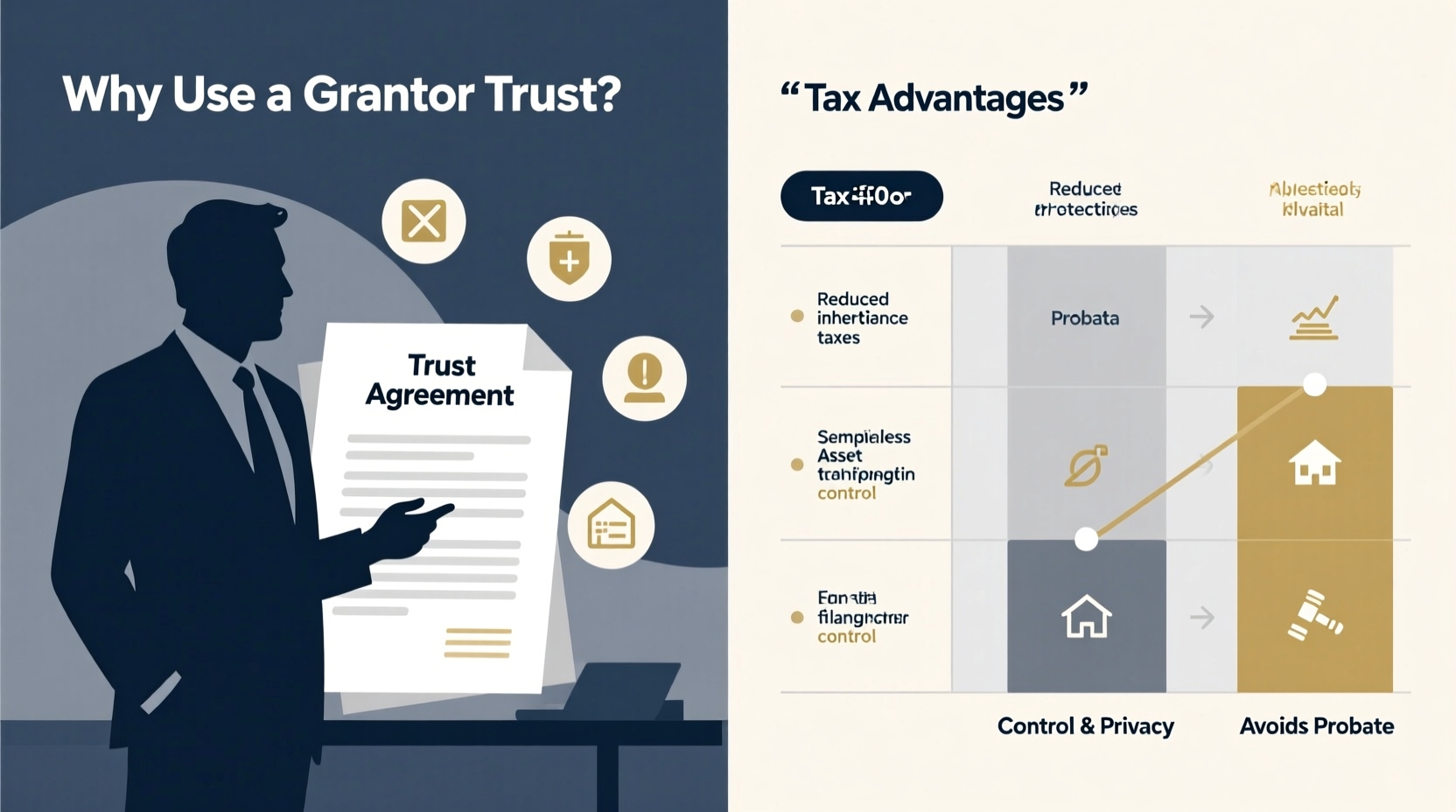In the realm of estate planning, few tools offer as much flexibility and strategic advantage as the grantor trust. Designed to provide control, tax efficiency, and asset protection, grantor trusts have become a cornerstone for high-net-worth individuals seeking to preserve wealth across generations. Yet, despite their widespread use, many remain unclear about how they work and whether they’re appropriate for their financial goals. This article explores the mechanics of grantor trusts, their compelling benefits, and the critical factors to weigh before implementation.
What Is a Grantor Trust?

A grantor trust is a legal arrangement in which the person who creates the trust—the grantor—retains certain powers over the trust’s assets or income, such as the ability to revoke it, change beneficiaries, or control investment decisions. Because the grantor maintains these rights, the Internal Revenue Service (IRS) treats the trust as a “disregarded entity” for income tax purposes. This means all income generated by the trust is reported on the grantor’s personal tax return, not the trust’s.
This distinction separates grantor trusts from non-grantor trusts, where the trust itself pays taxes on its income. The grantor trust structure enables unique planning opportunities, particularly around gift and estate tax minimization, while allowing the grantor to continue benefiting from the trust’s assets during their lifetime.
Key Advantages of Using a Grantor Trust
The popularity of grantor trusts stems from a combination of tax advantages, control retention, and long-term wealth preservation capabilities. Below are the most significant benefits:
- Tax-Free Growth for Beneficiaries: Since the grantor pays the income taxes on trust earnings, the trust assets can grow without being diminished by annual tax liabilities. This effectively allows the grantor to make additional tax-free gifts to beneficiaries.
- Estate Tax Reduction: Assets transferred into an irrevocable grantor trust are removed from the grantor’s taxable estate, potentially reducing estate tax exposure at death.
- Asset Protection: When properly structured, assets in a grantor trust can be shielded from creditors, lawsuits, or divorce settlements affecting beneficiaries.
- Control with Flexibility: The grantor can retain broad authority over investments and distributions, ensuring alignment with evolving family needs.
- Step-Up in Basis Avoidance (Strategic Benefit): Unlike assets held directly at death, trust assets do not receive a step-up in cost basis. While this may seem negative, it can be advantageous when combined with other strategies like low-basis asset sales during life or leveraging the grantor’s payment of taxes to accelerate growth.
Common Types of Grantor Trusts
Several specialized trust structures operate under the grantor trust rules. Each serves different planning objectives:
- Intentionally Defective Grantor Trust (IDGT): Despite the name, this is a deliberate design. An IDGT is irrevocable for estate tax purposes (removing assets from the estate) but treated as a grantor trust for income tax purposes (so the grantor pays taxes). This duality makes it one of the most powerful tools in advanced estate planning.
- Revocable Living Trust: Often used for probate avoidance, this trust becomes a grantor trust by default since the creator retains full control. However, it does not remove assets from the taxable estate.
- Grantor Retained Annuity Trust (GRAT): Allows the grantor to transfer appreciating assets into a trust while retaining an annuity payment for a set term. If the assets outperform the IRS hurdle rate, the remainder passes to beneficiaries free of gift tax.
Comparison of Common Grantor Trust Structures
| Trust Type | Estate Tax Benefit | Income Tax Paid By | Grantor Control | Best Use Case |
|---|---|---|---|---|
| IDGT | Yes – removes assets | Grantor | Partial (via trustee) | Transferring appreciating assets to heirs |
| Revocable Living Trust | No – assets still count | Grantor | Full | Probate avoidance & incapacity planning |
| GRAT | Limited (depends on term & performance) | Grantor | Temporary (annuity period) | Short-term wealth transfer with low valuation risk |
Critical Considerations Before Establishing a Grantor Trust
While the benefits are substantial, grantor trusts are not universally suitable. Several factors must be carefully evaluated:
- Irrevocability (in most cases): IDGTs and GRATs are typically irrevocable. Once assets are transferred, they cannot be reclaimed. This requires confidence in long-term planning goals.
- Gift Tax Implications: Transferring assets into an irrevocable grantor trust triggers a taxable gift, though it may be offset by the lifetime gift exemption ($13.61 million per individual in 2024).
- Administrative Complexity: Grantor trusts require separate tax identification numbers, annual reporting (Form 1041 with K-1s), and meticulous recordkeeping—even if no tax is paid by the trust.
- State Law Variations: Some states do not conform to federal grantor trust rules, potentially creating state income tax liability even when none exists federally.
- Changing Tax Laws: Future legislation could limit or eliminate current grantor trust advantages, especially as estate tax exemptions face potential reduction.
“Grantor trusts allow families to shift wealth efficiently while maintaining control—but only if implemented with clear objectives and expert guidance.” — Laura Simmons, JD, Estate Planning Attorney
Real-World Example: Using an IDGT to Transfer a Family Business
Consider Mark, a 65-year-old entrepreneur who owns a successful manufacturing company valued at $8 million. He wants to pass the business to his two children but is concerned about future estate taxes and losing control prematurely.
Mark establishes an Intentionally Defective Grantor Trust and sells the business to it in exchange for a promissory note at the applicable federal interest rate. The trust assumes ownership, removing future appreciation from Mark’s estate. Mark continues to pay income taxes on the trust’s earnings, effectively making tax-free contributions to his children’s inheritance. Over time, as the business grows to $15 million, the extra $7 million in appreciation passes to his heirs without additional gift or estate tax.
This strategy allows Mark to lock in today’s valuation, reduce his taxable estate, and maintain influence through a trusted co-trustee—all while supporting his children’s long-term financial security.
Action Checklist: Steps to Evaluate a Grantor Trust
Before moving forward, consider the following steps:
- Assess your net worth and determine if estate tax exposure justifies advanced planning.
- Identify assets suitable for transfer—high-growth potential assets are ideal.
- Consult with an estate attorney and CPA familiar with grantor trust mechanics.
- Determine whether a sale, gift, or hybrid approach best fits your goals.
- Review state-specific tax implications and compliance requirements.
- Document funding plans and trustee selection clearly.
- Monitor and adjust as tax laws or family circumstances evolve.
Frequently Asked Questions
Can I be the trustee of my own grantor trust?
You can serve as trustee of a revocable grantor trust. For irrevocable grantor trusts like IDGTs, it’s generally advisable to appoint an independent trustee to preserve asset protection and avoid re-incorporation into your estate, though you may serve as co-trustee with limited powers.
Do grantor trusts avoid probate?
Yes, assets held in a properly funded grantor trust bypass probate, allowing for faster, private distribution to beneficiaries without court involvement.
What happens if the grantor dies?
Upon death, the grantor trust typically becomes a non-grantor trust. Income taxation shifts to the trust or beneficiaries, and the terms of distribution govern asset transfer. Any remaining assets may receive a step-up in basis for income tax purposes, depending on jurisdiction and trust language.
Final Thoughts and Next Steps
Grantor trusts are not merely legal constructs—they are dynamic instruments that align financial goals with family legacy. Whether your aim is minimizing taxes, protecting assets, or ensuring smooth generational transfer, the strategic use of a grantor trust can deliver lasting value. But success depends on precise execution, ongoing management, and alignment with broader financial objectives.









 浙公网安备
33010002000092号
浙公网安备
33010002000092号 浙B2-20120091-4
浙B2-20120091-4
Comments
No comments yet. Why don't you start the discussion?